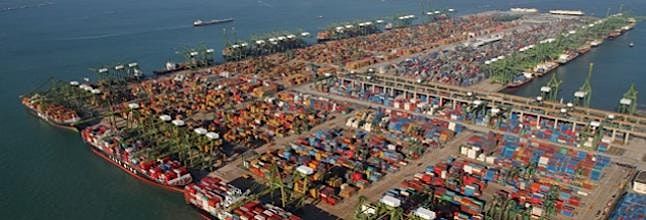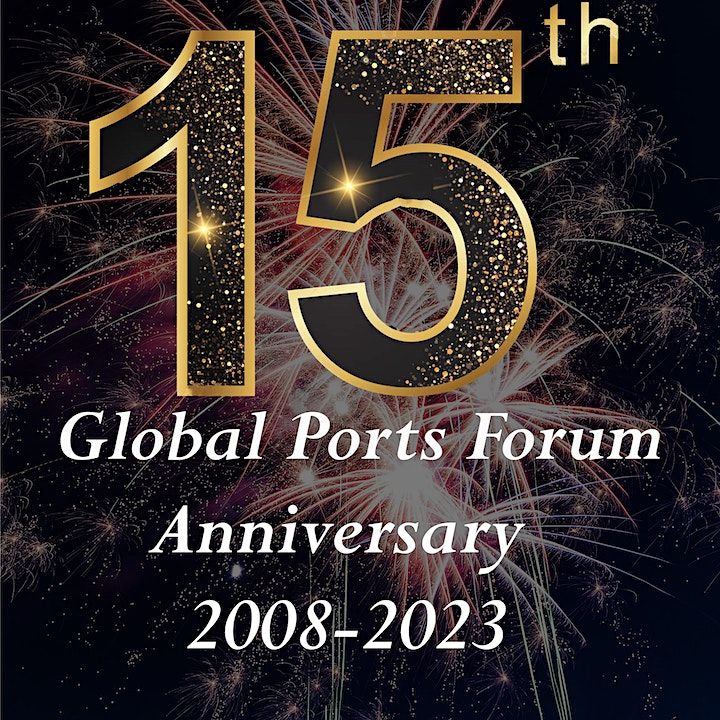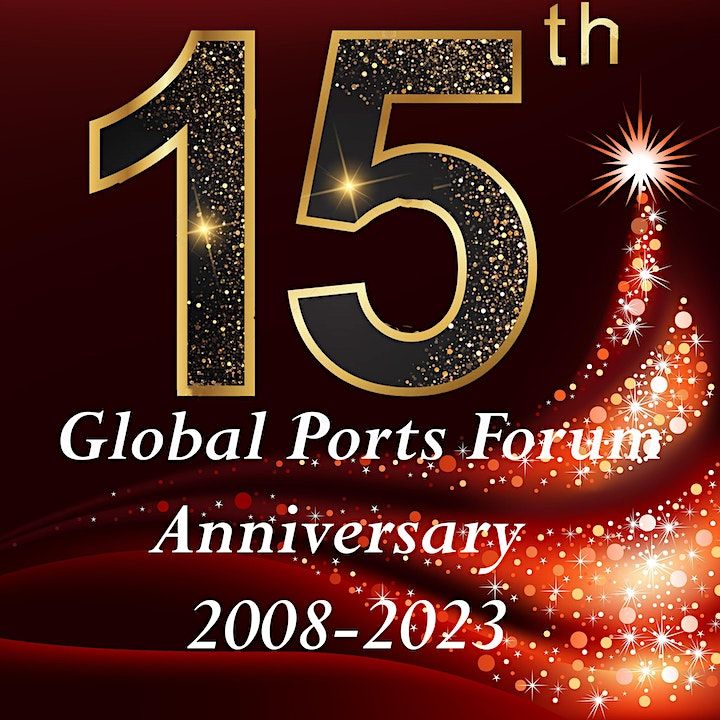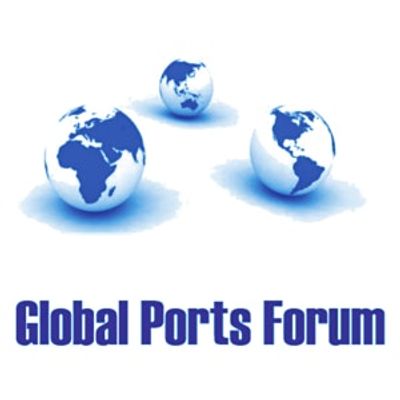
About this Event

GPF Executive Workshop on Excellence in Container Terminals Operations and Planning, 13-14 Jul 23 SingaporeDear industry colleagues
GPF Executive Workshop on Excellence in Container Terminals Operations and Planning, 13-14 Jul 23 Singapore
STRUCTURE
This two days Executive Workshop is targeted to provide an overall understanding about the role of Container Terminals in the entire logistics chain for decision makers and supporters from Terminal planning and operations, Marketing and Support services like IT, Engineering services and logistics.
In four sessions the workshop covers:
Significance and impact of containerization in international seaborne trade, pattern of container trades, type of container vessels plying on trade routes; planning and development of container terminals, type of concessions for terminal investment, Operations parameters, Key Performance Indicators and Standard Operating Procedures, container handling equipment and technological developments; Marketing of terminals customers and Services provided; Tariff for container services benchmarking and determination of tariff.
SIGNIFICANCE and RELEVANCE
Within less than four decades of effective commencement, container trade is the fastest growing segment in the international seaborne trade. From a modest 2% share in the eighties, today the container trade has reached close to 17% of world trade of over 10.3 billion tons. The pace of growth in the container trade is estimated to continue over next five years and subsequent periods despite a number of economic and geo-political factors impacting the growth and direction of world trade. It is therefore important for the decision makers involved in this industry to comprehend the environment and important aspects impacting container industry mainly consisting of container shipping, container terminals and intermodal logistics solutions.
Learning Objectives
- Pattern of World seaborne trade and share of containers – historical and projected
- Emergence of container shipping - type and size of container vessels and trade routes being served by different vessels, impact of containerization on logistics and trade
- Commercial, documentation and e-commerce aspects of containerization and multimodal transport
- Direct and transhipment shipments – hub and spoke pattern of trades
- Operating structure of container shipping lines – alliances, M&A activities
- Container terminals – operators and market positioning
- Container terminals – investments through PPP route and concession agreements
- Container terminals – planning and development of infrastructure and superstructure
- Container terminals – Planning, Operations, standard operating procedures and KPIs
- Intermodal logistics – Role in supply chain, investment, marketing and value proposition
Deliverables
At the end of this program, the participants should be able to:
- Learn the importance of role of container trades in international maritime trade
- Understand the challenges posed on container terminals by technological developments and work out strategies to meet these challenges
- Optimization of logistics costs through intermodal logistics solutions and its relevance on trade competitiveness
- Comprehend the complete aspects of container terminals – Planning, development, investment, operations, benchmarking and KPIs
- Identify value proposition and unique selling proposition of the intermodal services and prepare marketing plans and strategy
- Prepare a commercial feasibility through basic financial modelling of container terminal investment.
Who Should attend
Operations, Marketing, Other allied services like IT, Engineering service, railways personnel from Port Authorities; Cargo owners – importers and exporters; Port / Terminal developers, Port operators; Banks, PE, Port Service providers; Shipping Companies, Forwarders, Logistics companies, Container leasing companies, Multimodal Service providers; Port Equipment Suppliers; Port Designers / Planners; Port Consultants
Course Outline
Session 1
Important events and developments in world seaborne trade with reference to container industry; Co-relation between economy and container trade volume; present important factors and developments impacting trade volume. World wide container trades, important trade lanes and routes; Container trade imbalances and requirement for repositioning. Main Hub ports and areas covered by hubs. Container shipping lines and alliances; type and size of container ships and their impact on terminal design and container handling equipment. Type and size of containers and container handling equipment and technologies. Container shipping and dynamics of freight markets, elements of total logistics costs and their impact on value / volume of trade.
Session 2
Container terminal operators and world wide terminals being operated by different international operators. Investment through PPP route in different locations and type of concession agreements. Container terminals planning process – site selection, prefeasibility studies, bidding process, LOI and in-principle approval for container terminal development from competent authority, complete roadmap for terminal planning along with infrastructure for hinterland linkages, preparation of market volume assessment and competition analysis in order to prepare a service offering and determination of pricing strategy and tariff for the services. Benchmarking of tariff through regional and international tariff levels. Preparation of detained project report and assessment of investment, method of financing different parts of the terminal investment and making financial closure.
Session 3
Container terminal service parameters and categories of customers – vessel owners / operators and cargo owners – shippers / receivers. Service parameters for each category of customers – vessel turn around time anchorage to anchorage and berth to berth, crane productivity and berth productivity. Safety and security of vessels and cargo. Yard management and gate management and productivity for effective cargo management and on-time delivery / shipment of containers. Management of CFS and rail / waterways transportation for smooth intermodal services and facilitation of allied services customs, transporters, forwarders and other third party service providers. Importance of the service parameters and management of berthing windows / slots for maintaining vessel schedule for global services by international vessel operators. Importance of smooth and timely receipt / despatch of cargo for seasonal requirements. Perishable cargo as well as high value commodities to maintain just in time concept for effective inventory management.
Session 4
Container terminal operations – preparing standard operating procedures, organization structure with roles and responsibilities and defining Key Performance Indicators or Key Result Areas. Operation compliance with respective ISO standards and Integrated Management System standards. Intermodal logistics services – the new role being assumed by leading terminal operators, identification of value proposition and USP of the intermodal logistics services. Service levels and service providers – port to port or door to door and role of terminals to cover the carrier or merchant haulage. Modes of transportation for door-to-door services and cost structure; selection of intermodal services and gateway ports based on most competitive costing. Role and importance of 3P / 4P service providers in intermodal services.
Financial viability of Container terminal investment with basic financial parameters: Preparation of long term business volume projections; yearly revenue streams; operating costs and phase wise terminal investments with calculations of cost of capital, interest and depreciation. This is a simplified version of basic financial calculations of terminal investment and operation. Conceptual introduction for effective cost control in all operations; volume projections and market assessment for terminal planning team, tariffs and revenue stream for accounting team and investment rationale and options for the finance team. Interactive session for all the functions within the organization for cross functional understanding of the container terminal business and the industry.
Methodology
A combination of class room training, interactive workshops, individual and group case studies will be used. Participants will be provided with advance reading material. The instructor will be available during and after the workshop for further clarification or consultation.
About the Course Director: (Subject to final confirmation)
Mr. Mukesh Parikh is associated with Global Maritime Industry for over 40 years. He has a distinction of having hands on Maritime Industry experience with continuous involvement in Training and Development throughout his distinguished career.
He has been conducting a number of executive training programs on ports and terminals at Singapore, UAE, South Africa and other international locations, in addition to his current position of Adjunct Professor at Adani Institute of Infrastructure Management.
Mr. Mukesh Parikh has a post graduate degree in Management with specialization in Marketing and Finance. He attended one year training program Professional Shipping at Norwegian Shipping Academy, Oslo.
During his career of 18 years in the Commercial Shipping, he was associated with UNCTAD/UNDP as a Trainer and Course developer. He attended two weeks instructors’ Workshop (Training for Trainers) organized by UNCTAD / UNDP in collaboration with The Ministry of Transport and Ports in Malaysia at Penang Port Commission. He conducted a number of training Programs in the Middle East, South East Asia and Indian subcontinent including developing a training program on General Shipping Management for Arab Maritime Transport Academy, Sharjah, UAE.
A sound foundation of Shipping Industry and clear understanding of market and customer expectation and requirement from service providers enabled Mr. Mukesh Parikh to build the next phase of his career in Ports and Terminal Industry.
He worked with The Adani Group in Senior Management position for 10 years from the inception stage of Mundra Port in India and made a major contribution to set up Business Development and Marketing team as well as establish Standard Operating Procedures for the entire spectrum of Operations in the port. He successfully built marketing and operations teams and trained them.
Since July 2014, Mr. Mukesh Parikh has taken up advisory and consultancy role for The Maritime Industry. His assignments cover Business volume estimation and hinterland mapping with competition analysis, Revenue forecasts for the life of the project and financial modelling, investment optimization in line with market potential; Commercial and legal aspects of logistics, cargo handling, warehousing contracts; business excellence and standardization of operating procedures; Organization development, structuring and Manpower planning and training. He has also advised a number of clients about the Concession agreements and entering in to sub-concessions.
Thomas Ng
Thomas Ng has over 28 years of consulting experience in the ports and shipping industry. Thomas is known for developing innovative solutions for players within the ports & shipping industry, — in areas of investments advisory, port strategy, development, marketing, planning & redesign, customer services and port operations; and delivering superior results.
He is the Executive Chairman of The Global Ports Forum (GPF) since 2008. The Global Ports Forum is a platform where all ports stakeholders in the ecosystem- port customers, port authorities, port operators, port people, port suppliers & service providers are gathered together to discuss about issues furthering the interests of ports globally.
Thomas is well-respected in the ports & shipping circles — recognized for his in-depth industry knowledge and far-reaching personal industry network and linkages. Some of his recent port investments advisory work include ports in the Middle East, Africa, Southern Europe, South East Asia, Latin America, etc.
Given Thomas’ far-reaching personal port industry network and linkages, Thomas is often seek out by port investors and port privatization candidates all over the world for collaborative partnership.
Thomas is invited regularly as speaker & facilitator for Ports conferences, roundtable and executive programs and workshops.
He is the senior port & terminal training expert for the Singapore Ministry of Foreign Affairs (MFA) Singapore Cooperation Programme (SCP) for foreign ports officials for over 10 years. Recent programmes conducted by Thomas include the 5 days executive program in “Port Development and Competitiveness”, Singapore on 12-16 Dec 2016 where Thomas was the key trainer for over 60% of the whole executive program. Some other early SCP programmes that Thomas taught over 20 senior foreign government transport officials included the 2 weeks Singapore MFA Executive Programme in Logistics & Distribution Management on 28 Aug – 10 Sep 2007 & again on 6 Oct – 17 Oct 2008.
Thomas spoke recently at the Transport Intelligence Singapore 2013 Infrastructure panel, together with senior executives from the World Bank & UPS, the Container Depot Association Singapore Conference 2014 on ports and infrastructure, Tank Storage Asia Conference in 2015 and an exclusive Roundtable on Smart ports & ships and Internet of Things in Jun 2016.
On a professional level, Thomas founded the non-government voluntary organization — The Global Ports Council (GPC) in 2008. As of today, over 192 C-level executives globally presents themselves as members of our council. Our prestigious list of Council members are as follows:
http://globalportsforum.com/the-global-ports-council/
Thomas is also a veteran Chartered member (since 2001) of the Chartered Institute of Logistics & Transport Singapore. He serves as a Board Member of the Singapore Branch of Chartered Institute of Logistics & Transport for over 16 years.
15th GPF Anniversary Special. Pay for Two participants, another Two comes free. No other promotion applicable.
Costs:
On or Before 13 May 2023:
The ‘Early Bird’ Rate is USD3995 – Save USD800!
Special Offer! – 3 Delegates For The Price of 2 in This Category! Save USD3995!
From 14 May 2023:
The Regular Rate is USD4795
Special Offer! – 3 Delegates For The Price of 2 in This Category! Save USD4795!
Note: All fees stated include luncheons, refreshments and complete set of documentation. It does not include the cost of accommodation and travel.
REGISTER NOW!
To register, please submit the following details to [email protected]:
Name:
Position:
Organisation:
Address:
Tel:
Fax:
Email:
What Best Describes Your Industry Sector?:Billing information:
For cheque payments: To be made payable to ‘Global Ports Forum Pte. Ltd.’ Please do not send post-dated cheque.
For telegraphic transfers:
Account Name: Global Ports Forum Pte. Ltd.,
Account No. : 695 477 141 001.
Beneficiary Bank: Oversea-Chinese Banking Corporation Limited, Singapore. (Swift: OCBCSGSG),
Address : 65 Chulia Street #01-00, OCBC Centre, Singapore 049513.
Please supply confirmation via email of the TT from your bank. Transmitting bank charges must be paid by sender. Please quote both delegate and company name as reference.
Kindly note that as we are providing a special rate for ‘early bird’ sign up, we will need to receive your company payment by 13 May 2023 to enjoy the discount.
Details of GPF forthcoming executive workshops/forums are available on our website at below link:
http://globalportsforum.com/forthcoming-gpf-executive-programmes/
Looking forward to welcoming you at the executive workshops/forums.
Kind regards
Thomas Ng
Chairman
The Global Ports Forum
GLOBAL PORTS FORUM PTE. LTD.
10 Anson Road
#18-11
International Plaza
Singapore 079903
Website: www.globalportsforum.com/
Mobile: +65 9684 3289
DID: +65 65197662
Fax: +65 6725 8438
Email: [email protected]
Terms & Conditions:
No delegate registration will be accepted without completing registration details and full payment.
Upon receipt of your registration details and full payment, further programme information will be emailed to you including your proforma invoice and, if required, a letter of invitation for entry visa application.
Delegates will not be admitted unless payment has been received in Full.
Flights, Airport Transfers and Accommodation are not included in your delegate registration fee.
Refund Policy – a reimbursement of the registration fee, minus administrative charges will only be made if the participant has notified Global Ports Forum Pte. Ltd. in writing that he/she is unable to attend the event no less than 45 days prior to the commencement of the event. No cancellation is allowed after that, but a replacement with another participant is allowed.
This programme is subject to change without notice, E&O.E.

Event Venue & Nearby Stays
M Hotel Singapore, Anson Road, Singapore, Singapore
USD 3995.00 to USD 4795.00
